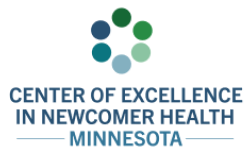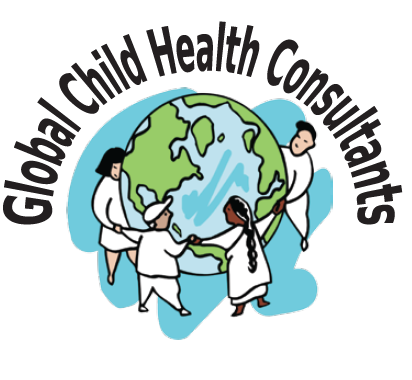Center of Excellence in Newcomer Health
- Minnesota Center of Excellence in Newcomer Health Home
- About
- Clinical Guidance and Clinical Decision Tools
- Health Education
- Publications and Presentations
- Trainings
- Newcomer Health Profiles
Spotlight
- Haitian Clinical Guidance
- OB-GYN Care for Afghans: A Toolkit for Clinicians
- Immigrant Health Matters
- Newcomer Education for Wellness Video Series
- MNCOE Connect
Related Topics
Trauma-informed Care, Tools, and Treatment Strategies for Afghan Refugee Children

This report is designed as an introduction to a child rights approach to trauma-informed care for Afghan refugee children and youth. It provides an overview of the trauma experienced by these families as they begin their readjustment to Minnesota and the United States.
In addition, it provides an introduction to the various emotional and behavioral issues than may arise as well as therapeutic approaches that have been used with this population. Included are appendices with a number of the screenings and assessment tools that have been tested and validated with this population of children. Versions have been provided in English and where available in Dari and Pashto.
The U.S. war in Afghanistan against the Taliban lasted 20 years, from 2001 to 2021. It was the longest war in the history of the United States. The Taliban returned to power in 2021, coinciding with a rapid withdrawal of U.S. troops and personnel. More than 122,000 people were airlifted abroad from the Kabul airport, including 97,000 Afghans. Among these refugees were tens of thousands of children who were deeply affected by these traumatic events and later appeared in U.S. clinics and hospitals. Providers are faced with the challenge to provide care to children who have had recent traumatic experiences.
This report is designed to provide tools that may be of value to providers when providing trauma-informed care (TIC) for these children. Not all Afghan refugee children’s experiences are identical, and exploring the impact of the trauma on their lives is a delicate endeavor that requires sensitivity and skill by those who seek to evaluate and provide care to these youngsters. A core principle in TIC is that the physical and mental problems identified are not an indication of what’s wrong with the child or adolescent but rather what has happened to them. Children’s exposure to serious trauma increases the likelihood of both immediate and a lifelong potential for serious health problems. As child health professionals, we have grown aware of trauma’s impact, realizing the value of trauma-informed approaches to care. TIC acknowledges the need to understand a patient’s life experiences in order to deliver effective care. The Substance Abuse and Mental Health Service Administration (SAMHSA) outlines an approach to trauma-informed care that incorporates four key elements:
- Realizing the widespread impact of trauma;
- Recognizing how trauma may affect clients, staff, and others in the program, organization, or system;
- Responding by applying knowledge about trauma into practice; and
- Preventing re-traumatization.
There is a broad body of research that has shown that traumatic and stressful experiences by refugee children are associated with anxiety, depression, and post-traumatic stress disorder (PTSD). However, it is also important to remember that children are resilient and can cope surprisingly well with exposure to trauma. The report presents a number of screening and assessment tool for identifying emotional and behavioral conditions that may be associated with trauma. These tools are made available in English, Dari, and Pashto.
Finally, there are a number of TIC interventions that have demonstrated to be effective for refugee children and youth experiencing trauma and PTSD. They are described in the report to provide a glimpse of the tools that may be considered when caring for these children. Though, many of the events that may have impacted these Afghan children are unique, this report and the tools provided may be applicable to other children arriving from other war-torn parts of the world.
Authors and acknowledgements
Dr. Charles Oberg is an outspoken advocate for children’s rights and trauma-informed care. He is a Professor Emeritus in the School of Public Health and the Department of Pediatrics at the University of Minnesota. He served as the Chair of the Maternal and Child Health MPH program as well as Head of Pediatrics at Hennepin County Medical Center in Minneapolis, MN.

His primary focus has been of providing access to care to refugee and immigrant families and their children. Dr. Oberg has provided needed medical care to refugee children on the island of Lesvos, Greece as well as in northern Jordan at the Al Zaatari Refugee Camp on the Syrian border. He has written extensively on the plight of “Children on the Move” including both immigrant and refugee children. He is President of the consulting group, Global Child Health Consulting.
Ms. Linda Norman is a marriage and family therapist with twenty years’ experience working with marginalized children, adolescents, and families who have experienced trauma. She developed a school-based program for Deaf and Hard of Hearing clients at Volunteers of America Mental Health agency. Linda is a certified provider of Dr. Ross Greene’s Collaborative and Proactive Solutions (CPS) approach helping children, teaching staff and families in solving problems at home, school, and community. She also has forty years’ experience as a teacher of the Deaf and Hard of Hearing students. Ms. Norman was also the coordinator for Social and Emotional Learning at Intermediate School District #287 in the west metropolitan area of Minneapolis, MN.
The authors would like to acknowledge the resilience of the recent emigration of Afghan families to the United States and Minnesota. The trauma they have experienced has been a palpable stress in their lives as they reestablish a new home here. They would also like to acknowledge the assistance from Dr. Raeli Bronstein from Oxford University in the United Kingdom for his research work on assessing the impact of trauma on refugee children. In addition, we are appreciative for his sharing of key screening and assessment tools which have been translated in both Dari and Pashto.
The Minnesota Center for Excellence in Newcomer Health is supported by NU50CK000563 from the U.S. Centers for Disease Control and Prevention.